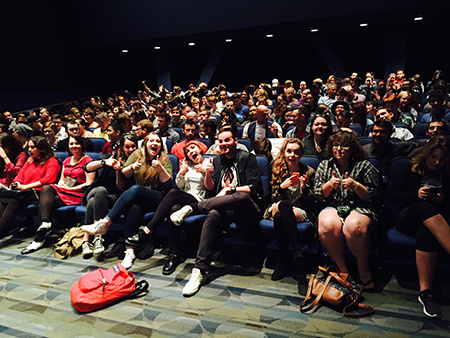Students Discuss Film About Former Gay Activist
WLP faculty Benoit Denizet-Lewis wrote a New York Times Magazine story which served as the basis of the new film I Am Michael, in which actor James Franco stars. Here, Franco Skypes in to the discussion held at the Bright Family Screening Room. Photo by Joseph Rezek.
An outspoken gay activist makes a 180-degree reversal, rejecting his sexuality, spreading anti-gay opinions, and joining the Christian clergy.
Emerson Writing, Literature and Publishing Assistant Professor Benoit Denizet-Lewis wrote a New York Times Magazine article about this former activist—who was once a personal friend of his. The article became the basis of the film I Am Michael, which was viewed by a full house at the Bright Family Screening Room during a Bright Lights screening on September 29.
Film Studies major Evan Slead ’16 wrote about his impressions of the film. Denizet-Lewis and director Justin Kelly were on hand for a post-film discussion.
The Boston Globe also covered the event.

A full house at the Bright Family Screening Room. Photo by Anna Feder
By Evan Slead ’16
The battle between the LGBTQ community and the fundamentalist Christian followers has been raging for decades. As the United States as a whole has become more accepting as a society due to the expansion of civil rights and second and third wave feminism, the debate seems to finally have reached a head.
The right of gay couples to marry rocked both communities—in radically different ways. This progress has not come without its own heartaches and headlines. Enter Justin Kelly’s new film, I Am Michael, which details the shift in Michael Glatze’s life from a premier gay activist to a Christian preacher.
Due to the sensitive nature of Glatze’s decision, Kelly was faced with the challenge of giving credence to both sides of the argument. The film does balance this as it begins with Michael’s life as a writer for XY magazine and living with his beloved Bennett. Michael, played brilliantly by James Franco, is a flawed but passionate man, which was a key choice on Franco and Kelly’s part to keep realism on the table.
The transition from his old life to the new maintains those flaws that allow the viewer to understand that this is one man’s own path and need to find truth. This film is not a PSA on the celebration of the gay community, nor is it a thesis on how to turn a gay man straight with the power of religion. It is a story of search and discovery that honors both sides of the argument, and frankly that is a stance that needs to be addressed in this ongoing debate.
Post-film discussion
After the film screening, a discussion was held with Kelly and Denizet-Lewis. Franco joined the conversation via Skype. Student Kellie Rainville collected the following quotes:
Justin Kelly: Even with a great cast and story, sometimes…movies are still a bit harder to get made…so it took us a while to find the right people.
Benoit Denizet-Lewis: When I wrote this piece it was very emotional for me. To go see this man who I had known in one way and was now writing these really awful things about gay people and, by extension, me and a community—it was the most difficult emotional piece I’ve ever had to do. And so I was really interested when I was leaving Wyoming after spending the weekend with him. I was trying to predict what would happen to him. Would he call me in 5–10 years and say that was all a mistake and I’m definitely gay? The way that he changes and continues to change and evolve is interesting to me and I want to follow up with that.
Audience Member: Why were you drawn to this particular person and this story?
James Franco: I actually went into this with a certain amount of faith. As interesting as the article and the story were, I really didn’t see how it would be a movie. It felt like it was sort of the opposite trajectory of what you’d expect a movie to depict. Normally, you’d think about following a character or two coming into themselves—kind of a liberation…. So I kind of went on faith because I thought there was something there and it was still touching on a lot of issues that were interesting to me about identity and who decides identity. If it was done right, it could be really powerful.
Categories